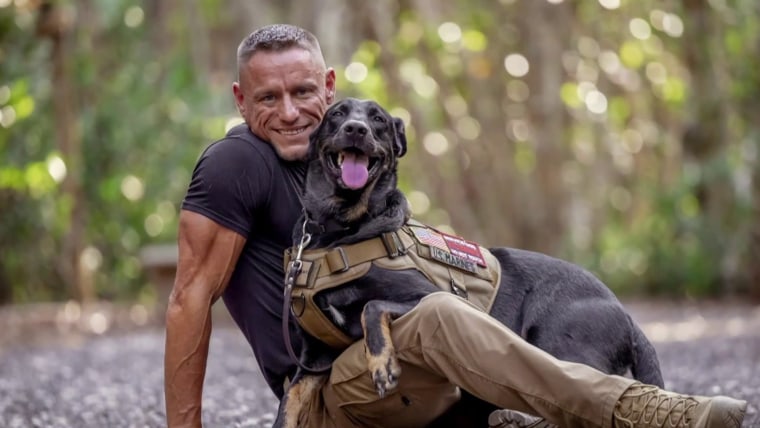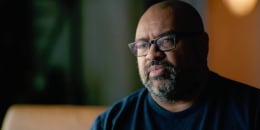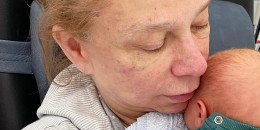Sarah Verardo is used to fielding hard questions from her daughters.
The North Carolina mom of three is married to Sgt. Michael Verardo, who was catastrophically wounded when he stepped on an IED while on patrol with the U.S. Army's 82nd Airborne Division in Afghanistan’s Arghandab River Valley in 2010. Michael lost his leg and has undergone more than 100 surgeries since returning from war.
But Verardo's middle daughter recently posed a question that left her speechless.
"Mary Scott asked me if I could go out to dinner with her dad soon. 'Like on a date mama!,'" Verardo, 38, shared in an emotional Instagram post. "I told her that because he goes to bed so early and the other challenges he faces, it didn’t seem likely."
Little Mary Scott immediately replied that she was sad for her mom and wanted her parents to go on a date.
"I told her I don’t need to go on a date, that I have hundreds of memories of dates stored up and they bring me such happiness," Verardo wrote. "'I have memories, I don’t need dates,' I told her."
But the 7-year-old's reply left Verardo speechless.
"'I don’t have memories of him mama,'" she said Mary Scott replied.
Verardo called her daughter's response a "knife to (the) heart."
"I work hard to look on every bright side, because there is almost always one. I stay in the light, because the sadness of what could have been is too much for me to comprehend," Verardo said. "But instead of dressing it up or playing it down, I validated her feelings. It IS sad. It IS hard. It DOES look different than we’d all hoped."
Verardo tells TODAY.com that Michael's traumatic brain injury is not something she hides from their daughters.
“When Michael was medically evacuated from Afghanistan to Walter Reed, there were so many unknowns” Verardo says, adding that Michael’s unit, 2nd Battalion, 508th Parachute Infantry Regiment, 82nd Airborne, sent 24 men home as casualties and had a 60% Purple Heart rate.
The unit was hit so hard that it had its own wing at Walter Reed National Military Medical Center.
“Michael was on imminent death status and miraculously survived that first night,” Verardo says. "Then he survived another night and another night ... Before that deployment, things were seen as very black and white. When Michael got his deployment orders, we thought there were two options: He is going to war and either he’ll come home or he won’t."
But it’s the middle ground that so few talk about.
"Candidly, I’m still in it,” Verardo tells TODAY.com as Michael's caretaker.
According to the CDC, more than 450,000 U.S. service members were diagnosed with a TBI between 2000 and 2021. TBI can cause a range of symptoms including memory loss, speech impairment, confusion, cognitive impairment and inability to regulate body temperature.
“One day Michael is present — he knows our girls, he is alert and can hold a short conversation,” Verardo says. “Other days, we’re not so lucky. My girls are aware of so much and yet understand so little.”
Verardo is the author of the children's book "Hero at Home" to help explain war injuries to kids.
“I have difficult conversations with the girls about their dad,” Verardo says. “I, of course, keep the conversation positive, but children are very aware, and I can’t explain away the reality.
Early on, Verardo worked with a child psychologist to help her explain difficult truths to little ears.
“I often tell the girls, 'Dad has a sleepy brain — it seems like his brain and body keep changing but he still has the same heart,'” she explains.
March marks Traumatic Brain Injury (TBI) Awareness Month, but for the Verardos, spreading awareness is a yearlong effort.
“Last month, Michael went to the end of our street with a helper to walk with the girls from the bus stop,” Verardo tells TODAY.com. “I watched from the driveway as our second-grader, Grace, sprinted home in tears. Grace said two boys were walking behind them and one asked the other, 'What’s wrong with that man?'
"Ever protective of her daddy, Grace tried to explain her embarrassment, frustration, sadness and anger to me. 'It wasn’t his leg, Mama. They asked what was wrong with him. Like maybe it was about how he was walking or staring or not talking.'"
After speaking to their mother, Verardo realized the boys could understand the leg injury but not the TBI, an injury that is far harder and more debilitating than anything that can be seen.
“We are proud of Michael every day," Verardo says. "He’s had over a decade of speech, visual, physical, cognitive and occupational therapies and works hard every day to give it all he has."
Verardo tells TODAY.com that the families of TBI survivors often absorb the blast impact long after the service member is medically evacuated.
"TBI survivors are remarkable, and no two cases are the same," she says. “Life looks very different than I thought it would, but I am so very grateful.”
Related video:











